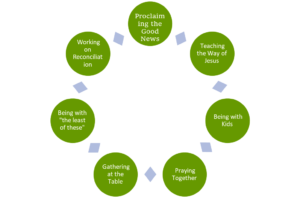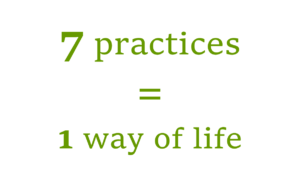Our Practices
Beliefs, values and mission statements mean nothing unless they are lived out. So what is it that we as a church community do together?
Our various groups, gatherings and programs—on Sundays and throughout the week—are the more formal, structured way we try to practice what we believe. Being the church, however, goes far beyond what happens on Sunday mornings or Wednesday evenings.
We’re convinced that God is active and present in the world today. We can describe this activity as “the presence of Jesus” or “the work of the Holy Spirit”—either way, it’s God’s love happening among us. Our job is to discern His presence and to cooperate with what He’s doing, making His presence visible.
Jesus gave us specific practices to do that make space for His presence.[1] These are activities we can do together—wherever we happen to be. It doesn’t matter if we’re gathered with other followers of Jesus on a Sunday morning or hanging with friends at a Friday barbeque.
So, we’re learning to “practice” these practices in all the circles of our lives. They’re not a religion. They’re certainly not rules. They’re a way of life that we get to do with Jesus and with each other.
We hope you’ll want to join us!
30 When he was at the table with them, he took bread, blessed and broke it, and gave it to them. 31 Then their eyes were opened, and they recognized him; … 35 Then they told what had happened on the road, and how he had been made known to them in the breaking of the bread. (Luke 24)
When we sit together to eat and to drink, Jesus promises to be present among us. We believe it is through such basic daily activities that God meets us. So we seek to regularly share daily life, including meals, with one another.
9 “Pray then in this way: Our Father in heaven, hallowed be your name. 10 Your kingdom come. Your will be done, on earth as it is in heaven …” (Matthew 6)
Jesus refers to God’s way as God’s “kingdom.” We believe that Jesus’ life, death and resurrection launched God’s way into the world. And so, we pray—often and regularly—that God’s way would come more and more fully into our hurting world and our own broken lives.
 Being with “the least of these”
Being with “the least of these”
40 … “Truly I tell you, just as you did it to one of the least of these who are members of my family, you did it to me.” (Matthew 25)
Jesus holds a special place for the marginalized. We believe that as we give our attention to those who have been viewed as less in the eyes of the world, somehow God shows up. We know it’s hard to stop and to really pay attention to the needs of others in our compulsively busy world, but this is our prayer and our desire.
5 “Whoever welcomes one such child in my name welcomes me.” (Matthew 18)
We’re convinced that something amazing happens when we who are older get down on our knees and enter the world of the young. Jesus wants us to take the time to be present with our youth and children.
19 Go therefore and make disciples of all nations, baptizing them in the name of the Father and of the Son and of the Holy Spirit, 20 and teaching them to obey everything that I have commanded you. And remember, I am with you always, to the end of the age.” (Matthew 28)
Being a “disciple” means being a learner. So, we commit to the lifelong process of teaching one another Jesus’ way of living life.
15 “If another member of the church sins against you, go … 20 For where two or three are gathered in my name, I am there among them.” (Matthew 18)
“…if you remember that your brother or sister has something against you, 24 leave your gift there before the altar and go; first be reconciled to your brother or sister, and then come and offer your gift.” (Matthew 5)
Broken relationships are all around us. None of us are excused from blame. Jesus promises to be especially present when we’re working to patch up our relationships. We believe the reason Jesus came was to heal and to reconcile us—to God and to one another.
16 “Whoever listens to you listens to me, and whoever rejects you rejects me, and whoever rejects me rejects the one who sent me.” (Luke 10)
Our world has no shortage of bad news. We’re convinced Jesus is good news. For everyone. So, we practice speaking this good news—at the right times and in the right ways. After all, who doesn’t need to hear a little good news?
[1] These seven practices are derived (with some modification) from the book Faithful Presence by David Fitch. Check it out, it’s worth the read!









